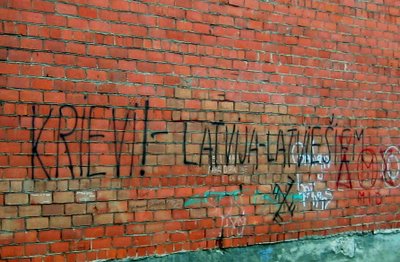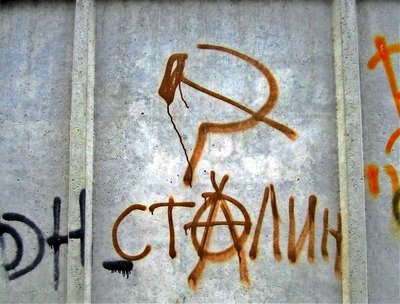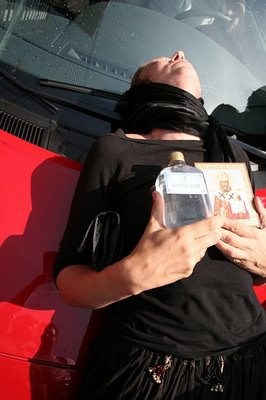 Graffiti similar to the graffito in the photograph above, taken in Bread Street in Daugavpils but reportedly scrawled in other strategic locations (across from the Russian Consulate and the Russian House), was seized upon by the usual propagandists as an indication of a problem with supposedly renascent "Latvian fascism" prior to October's parliamentary elections. (Translation of the writing on the wall: Russians! Latvia -- for Latvians.) So, whilst the muse that ought to have made me write reflections on the elections avoided my invocations last fall (what kind of Latvia blog is this, if there wasn't even an assessment of that insipid poll and its predictable result?), I began some brief musings on extremes and extremists instead.
Graffiti similar to the graffito in the photograph above, taken in Bread Street in Daugavpils but reportedly scrawled in other strategic locations (across from the Russian Consulate and the Russian House), was seized upon by the usual propagandists as an indication of a problem with supposedly renascent "Latvian fascism" prior to October's parliamentary elections. (Translation of the writing on the wall: Russians! Latvia -- for Latvians.) So, whilst the muse that ought to have made me write reflections on the elections avoided my invocations last fall (what kind of Latvia blog is this, if there wasn't even an assessment of that insipid poll and its predictable result?), I began some brief musings on extremes and extremists instead. By the time I first heard about the "fascist graffiti" (not a little of which is within a "bull's spitting distance" from my home, as I interpret that ancient Lettish measure), it had been removed. This second graffito, though, has been around the corner for years -- it says "Stalin" (in Cyrillic script), the "A" circled in the customary symbol for anarchism (how one could try to reconcile Stalinism with anarchism is... beyond my scope). I actually learned about the "fascist" scrawls in the foreign media; I never saw them nor heard about them from locals, so quickly were most of them removed. When I went to take the snapshot of "Stalin" at the request of my friend Dmitry, a Latvian Russian who has long lived in Nottingham, I finally encountered the example on the red brick wall.
By the time I first heard about the "fascist graffiti" (not a little of which is within a "bull's spitting distance" from my home, as I interpret that ancient Lettish measure), it had been removed. This second graffito, though, has been around the corner for years -- it says "Stalin" (in Cyrillic script), the "A" circled in the customary symbol for anarchism (how one could try to reconcile Stalinism with anarchism is... beyond my scope). I actually learned about the "fascist" scrawls in the foreign media; I never saw them nor heard about them from locals, so quickly were most of them removed. When I went to take the snapshot of "Stalin" at the request of my friend Dmitry, a Latvian Russian who has long lived in Nottingham, I finally encountered the example on the red brick wall.
Obviously, it only takes one juvenile delinquent (whatever his or her physical age) with a can of spray paint to create this sort of ruckus. "By any standard, extremism in Latvia has been quite weak," Nils Muižnieks (one of the foremost experts on human rights in this country) noted five years ago in his overview of these sinister sports. The idea that there could be a significant movement devoted to Russian-bashing in a rather harmoniously multicultural city where ethnic Latvians make up only about a fifth of the population and Russian is overwhelmingly the lingua franca is quite simply ludicrous to anybody who knows this town.
But this is really about resonance and perception, isn't it? We're quite accustomed to an annual scandal on March 16th, when a few surviving veterans of the Latvian Legion commemorate the sacrifices of Latvians who served in the Waffen-SS during the Second World War (it should be noted that not only ethnic Letts did so, by the way -- for those who read Latvian or Russian, there is an article entitled "Latvia's Russians on Hitler's Side in the Battle Against Bolshevism" available here), most of them forcibly (and illegally) conscripted. The former Legionnaires, who never had any sympathy for Nazism and try to go about their memorial services solemnly, are lately outnumbered by loud Russophone radicals (including even Cossacks) and young Lettish extremists. Last year, in what many saw as a sign of post-Soviet repression, the Freedom Monument was fenced off to prevent clashes -- this year, five groups of radically different persuasions have received permission to gather (others, who didn't apply for permits, might also have a go at it -- that would include the National Bolsheviks who painted "Stalin" on the gray wall above).
March 16th is marked because it was the one occasion when both Latvian divisions fought side by side against the Soviets, in the Ostrov sector of the Eastern Front -- otherwise, the Germans were careful to keep the Latvians apart. Not an official day of rememberance (in fact, the President advised true patriots to stay at home), it is nonetheless the focus not only of ragtag radical groups on both sides of the fence -- it is an annual public relations débâcle diligently amplified by Moscow. The Latvian foreign policy expert Atis Lejiņš wrote:
March 16 is a repeated opportunity for certain circles that cannot reconcile themselves with Latvia’s regained independence and a free Latvia’s and Russia’s political relations. We are too independent. An opportunity like March 16 to avenge Latvia for regaining independence is too good to pass by.
Why are we giving our enemy this opportunity? Is it because we simply aren’t politically wise enough, or is it because something foul remains from the Nazi occupation, which we don’t want to admit to as candidly as we have to the Soviet occupation? Or is it, after all, that an evil root is hidden in 1939 and a year later, when we surrendered without even the smallest display of resistance?
Despite being habituated to the vagaries of a very small and complex country's public image abroad, against a background of ignorance and well-oiled spin (not only with regard to Latvia and the Baltics, but to all of Eastern Europe), I still suffer from bouts of nausea (most recently after reading Konstantin Kosachev's Guardian piece). As Andrew Ezergailis, the primary historian of the Holocaust in Latvia, noted recently in a diffuse debate about these topics at Latvians Online:
For example, why is it that after the smoke of WWII has cleared, or should have cleared, there are numerous well educated and clever people who think that the people who lived between Germany and Russia, those people who were conquered, economically exploited, disarmed (yes! disarmed), deported, and murdered by the million, by either or both of the imperial powers, end up being considered the real murderers and evildoers of the Twentieth Century. My emphases is on them rather than us, although I am fully aware that in this situation there is a risk of confusing object with subject. I have come to suspect this absurdity happened because the rhetoric and sources of historical texts, the Holocaust in particular, have been in the hands of both imperial powers. I have also come to conclude that it was the Nazi who blessed us with the most ingratiating line. It penetrated the minds of the victors and the vanquished, the victims and the torturers, the devils and the angels.
As can be seen from some of the comments on Kosachev's piece, ideology also helps to blind many to the truth about our history. George Galloway still has a following, after all. Asked if his position was that of the "Stalinist left," Galloway said: "I wouldn't define it that way because of the pejoratives loaded around it; that would be making a rod for your own back. If you are asking did I support the Soviet Union, yes I did. Yes, I did support the Soviet Union, and I think the disappearance of the Soviet Union is the biggest catastrophe of my life."
Alina Lebedeva, who brought Daugavpils fifteen minutes of fame by whacking Prince Charles with a carnation, found adulation from that end of the spectrum in "Old Europe." When I spoke to her, she professed strong admiration for Stalin ("he made Russia great") and for Eduard Limonov's spree with Radovan Karadžić, when the National Bolshevik leader fired a sniper rifle into Sarajevo (quoth Alina: "he was defending the Slavs"). I'm used to the broad definition of "fascist" many homines sovietici brandish (my friend Dmitry, for instance, was called a "fascist" for resisting the Soviet draft), but we're now in a world where part of the left defines itself only by its anti-Americanism. Not only is the unknown or misunderstood modern history of Latvia cause for the demonization of our country in certain quarters -- so are Rīga's intimate relations with Washington.
Not that we don't have severe problems -- there is indeed intolerance of various types in Latvia, society is definitely sharply divided, and the political scene often makes one wish one didn't have a nose. That said, back to the rôle of that kid with the spray paint -- this is a nation that is rapidly recovering from over half a century of totalitarian rule, Soviet and Nazi. The legacy of the occupation(s) is an almost unimaginably difficult one -- unlike the satellites, the Baltic States were forcibly incorporated into the USSR. Thinking about the frequent confusion between "the Baltics" and "the Balkans" one actually still encounters at times among those who know nothing about the "New Europe," one might consider how remarkable the recovery here has been -- except for those killed by OMON at the time of the Barricades, the intense tensions of restoring our lost statehood have not resulted in any bloodshed. In only fifteen years, the foundation for democracy and a civil society, wholly absent under the Soviets, has been laid -- Latvia ranks above Britain, Denmark, Canada, and the United States in press freedom, for example, according to Reporters Without Borders. Latvia is a better example of how difficulties can be overcome than it is an example of strife, which is practically non-existent. Compare, for instance, Northern Ireland, in that cradle of liberal democracy, the UK. When the ultra-rightist NSS marches in Rīga on the 16th -- bear in mind the fact that it garnered a mere 1172 votes in the last elections, or 0,13% of the total.
 The reality is that many of Latvia's current problems are not so different from the problems many European countries face -- confusion and apathy in the face of globalization, consumerism, kleptocracy, pauperization and a distant eurocracy... a resurgent far right, an intellectually bankrupt left, and a greasy polittekhnologiya, all crowned with a neoliberal political center that is out of touch with the people. The kid with the paint is always trying to draw attention to himself, like the woman above -- the wife of a prominent (and anti-American, and euroskeptical) folk singer who converted to Orthodoxy, she's blocking a car containing gay activists (the photograph is by Nikolai Alekseev -- that's holy water she's holding, by the way, not vodka). Parties like the NSS, affiliated with the European National Front, and Raivis Dzintars' more moderate rightist party (which got only 13 469 votes) are far from the mainstream, but they are increasingly adept at protest techniques (such as standing about shirtless in subzero cold).
The reality is that many of Latvia's current problems are not so different from the problems many European countries face -- confusion and apathy in the face of globalization, consumerism, kleptocracy, pauperization and a distant eurocracy... a resurgent far right, an intellectually bankrupt left, and a greasy polittekhnologiya, all crowned with a neoliberal political center that is out of touch with the people. The kid with the paint is always trying to draw attention to himself, like the woman above -- the wife of a prominent (and anti-American, and euroskeptical) folk singer who converted to Orthodoxy, she's blocking a car containing gay activists (the photograph is by Nikolai Alekseev -- that's holy water she's holding, by the way, not vodka). Parties like the NSS, affiliated with the European National Front, and Raivis Dzintars' more moderate rightist party (which got only 13 469 votes) are far from the mainstream, but they are increasingly adept at protest techniques (such as standing about shirtless in subzero cold).
What's really worrisome with regard to intolerance is its creeping aspect, for want of a better description -- the legitimization of odious ideas by the mainstream: the willingness of serious politicians to pander to them, their inclusion in major public debates without a caveat, and... lately, their international connections (for example...). In a united Europe, we are experiencing the paradox of anti-European groups working together (an excellent example was the instant contribution of the far right in Romania and Bulgaria to the creation of a bloc in the EP). On the other hand, I am quite convinced that muzzling extremists is the wrong thing to do. Open debate is what we need. The other side can and does cooperate, too, whether that is the European Movement, LGBT rights activists, or the spawn of the generous George Soros. Abrogating freedom of assembly and freedom of speech is as ugly when it's done by the politically correct as it is when it's done by dictatorships, and I briefly joined the right emotionally when the Freedom Monument was surrounded by a fence last March -- we must cross our fingers and hope that the police do their duty better than they did during the gay pride events last summer, but I would rather see a mêlée than muzzles.
In Latvia, we use the term sarkanbrūnie -- "the red-brown." Some people, especially those from the Western pseudo-left, don't seem to realize that groups like the Vanguard of Red Youth, also planning to take to the streets on Friday, are closer to brownshirts than they are to whatever decent left we have left (their Russian acronym, AKM, also stands for a type of Kalashnikov). My recommendation to those observing Friday's events from afar, or through a filter, is to try to read some real history, like Ezergailis' latest book,
and to take care to separate polemics and propaganda from fact.
The first two photographs are mine (like all others on this site, unless otherwise noted). The third photograph is by Nikolai Alekseev. The English translation of the extract from Lejiņš is by Elizabete Rūtens. For much more pleasant Latvian graffiti than the two examples I shot, see this site.
Labels: extremism, far left, far right, latvia, legion, nazis, neonazis, waffen ss, world war two
 Pastor Ken Hutcherson's visit to Latvia as a self-described "special envoy" who came here "representing the White House" has attracted considerable attention abroad, notably from the Seattle Times' chief political reporter, David Postman, the Stranger's Eli Sanders, Deutsche Presse-Agentur, and the Q-Seattle blog, which also ran a comment of mine about religion in Latvia. Hutcherson was accompanied by Scott Lively, the author of a book that blames "homosexualism" for Nazism (debunked here). Lively called Latvia "a zone of intense confrontation between Christians and homosexuals." He went on to say: "This nation will be our main battlefield against this counter Christian [sic] culture. God gave Kenneth Hutcherson and me to see that Alexei [Ledyaev] is the very man God placed to direct this battle, and church [sic] should support him in all respects." The visitors' meetings with Latvian religious leaders like Cardinal Pujats is described from their Christianist point of view at New Generation's website.
Pastor Ken Hutcherson's visit to Latvia as a self-described "special envoy" who came here "representing the White House" has attracted considerable attention abroad, notably from the Seattle Times' chief political reporter, David Postman, the Stranger's Eli Sanders, Deutsche Presse-Agentur, and the Q-Seattle blog, which also ran a comment of mine about religion in Latvia. Hutcherson was accompanied by Scott Lively, the author of a book that blames "homosexualism" for Nazism (debunked here). Lively called Latvia "a zone of intense confrontation between Christians and homosexuals." He went on to say: "This nation will be our main battlefield against this counter Christian [sic] culture. God gave Kenneth Hutcherson and me to see that Alexei [Ledyaev] is the very man God placed to direct this battle, and church [sic] should support him in all respects." The visitors' meetings with Latvian religious leaders like Cardinal Pujats is described from their Christianist point of view at New Generation's website.








